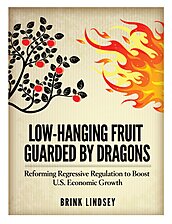Progressives, conservatives, and libertarians have a strong common interest in reversing this growth slowdown. They may have different ideas about what to do with the extra money yielded by higher growth, but all sides have a stake in getting a chance to fight it out.
Agreement on ends, however, need not translate into agreement on means. Indeed, the U.S. political debate today is beset by intractable ideological conflicts over tax and budget policy, financial regulation, health care financing, and many other issues with a strong bearing on the climate for economic growth.
Despite today’s polarized political atmosphere, it is possible to construct an ambitious and highly promising agenda of pro-growth policy reform that can command support across the ideological spectrum. Such an agenda would focus on policies whose primary effect is to inflate the incomes and wealth of the rich, the powerful, and the well-established by shielding them from market competition. A convenient label for these policies is “regressive regulation”—regulatory barriers to entry and competition that work to redistribute income and wealth up the socioeconomic scale. This paper identifies four major examples of regressive regulation: excessive monopoly privileges granted under copyright and patent law; restrictions on high-skilled immigration; protection of incumbent service providers under occupational licensing; and artificial scarcity created by land-use regulation.
Although there are vigorous debates about proper policy in all of these areas, the contending sides are not divided along left-right or Republican-Democratic lines. And it’s not simply the case that one can find policy experts on both sides who favor reform. Rather, it’s very difficult to find disinterested experts anywhere on the political spectrum who support the status quo. Such support is largely confined to the well-organized lobbies that profit from the current rules.
Hence the title of this paper. For all who are interested in better long-term U.S. economic performance, rolling back regressive regulation is the low-hanging fruit. Reforming these policies is something we know will make a positive difference, and by “we” I mean the vast majority of disinterested experts. Unfortunately, though, this lowhanging fruit is guarded by “dragons”—the powerful interest groups that benefit from the status quo, all of which can be counted upon to defend their privileges tenaciously.
Although opposition to progress would be formidable, pursuing an agenda of curbing regressive regulation would open up a new front in the ongoing policy fight. Instead of another left-right conflict, the contest could be framed as a choice between the public interest and vested interests. With an unprecedented deterioration in the long-term growth outlook now looking likely, this novel approach is well worth trying.

